银行业金融机构衍生产品交易业务管理暂行办法2011
金融机构衍生产品交易业务管理暂行办法
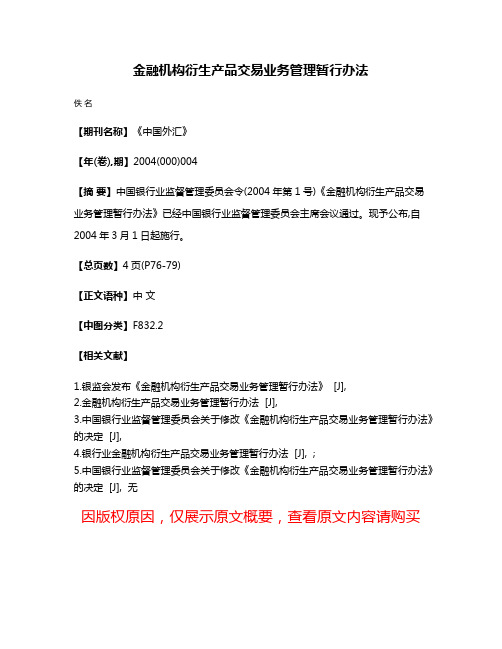
金融机构衍生产品交易业务管理暂行办法
佚名
【期刊名称】《中国外汇》
【年(卷),期】2004(000)004
【摘要】中国银行业监督管理委员会令(2004年第1号)《金融机构衍生产品交易业务管理暂行办法》已经中国银行业监督管理委员会主席会议通过。
现予公布,自2004年3月1日起施行。
【总页数】4页(P76-79)
【正文语种】中文
【中图分类】F832.2
【相关文献】
1.银监会发布《金融机构衍生产品交易业务管理暂行办法》 [J],
2.金融机构衍生产品交易业务管理暂行办法 [J],
3.中国银行业监督管理委员会关于修改《金融机构衍生产品交易业务管理暂行办法》的决定 [J],
4.银行业金融机构衍生产品交易业务管理暂行办法 [J], ;
5.中国银行业监督管理委员会关于修改《金融机构衍生产品交易业务管理暂行办法》的决定 [J], 无
因版权原因,仅展示原文概要,查看原文内容请购买。
中国银行业监督管理委员会办公厅关于实施《金融机构衍生产品交易业务管理暂行办法》宽限期的通知

中国银行业监督管理委员会办公厅关于实施《金融机构衍生产品交易业务管理暂行办法》宽限期的通知
文章属性
•【制定机关】中国银行业监督管理委员会(已撤销)
•【公布日期】2004.08.26
•【文号】银监办发[2004]240号
•【施行日期】2004.08.26
•【效力等级】部门规范性文件
•【时效性】失效
•【主题分类】银行业监督管理
正文
*注:本篇法规已被《中国银监会关于制定、修改、废止、不适用部分规章和规范性文件的公告》(发布日期:2007年7月3日实施日期:2007年7月3日)废止
中国银行业监督管理委员会办公厅关于实施《金融机构衍生产品交易业务管理暂行办法》宽限期的通知
(银监办发[2004]240号2004年8月26日)各银监局,各政策性银行、国有商业银行、股份制商业银行:
为促进金融机构衍生产品业务的顺利开展,现就《金融机构衍生产品交易业务管理暂行办法》(以下简称《办法》)宽限期问题通知如下:
适用《办法》的金融机构,目前尚未获得银监会批准开办衍生产品交易业务,但在《办法》颁布之前已经从事部分衍生产品交易的,可以在2004年12月31日前继续办理该部分衍生产品交易,但不得办理除此之外的新业务品种。
《办法》颁布前未从事衍生产品业务的金融机构,在未获得监管机构批准的情况下,不得办理衍生产品交易业务。
2004年12月31日以后,所有适用《办法》的金融机构,在未获得监管机构批准的情况下,不得办理衍生产品交易业务。
请各银监局将本通知转发至辖区内各银监分局及城市商业银行、外资银行。
银行业金融机构衍生产品交易业务管理办法

银行业金融机构衍生产品交易业务管理办法(根据中国银行业监督管理委员会第101次主席会议《关于修改〈金融机构衍生产品交易业务管理暂行办法〉的决定》修订)第一章总则第一条为规范银行业金融机构衍生产品业务,有效控制银行业金融机构衍生产品业务风险,根据《中华人民共和国银行业监督管理法》、《中华人民共和国商业银行法》及其他有关法律法规,制定本办法。
第二条本办法所称银行业金融机构是指依法设立的商业银行、城市信用合作社、农村信用合作社等吸收公众存款的金融机构以及政策性银行。
依法设立的金融资产管理公司、信托公司、企业集团财务公司、金融租赁公司,以及经中国银行业监督管理委员会(以下简称中国银监会)批准设立的其他银行业金融机构从事衍生产品业务,适用本办法。
第三条本办法所称衍生产品是一种金融合约,其价值取决于一种或多种基础资产或指数,合约的基本种类包括远期、期货、掉期(互换)和期权。
衍生产品还包括具有远期、期货、掉期(互换)和期权中一种或多种特征的混合金融工具。
第四条本办法所称银行业金融机构衍生产品交易业务按照交易目的分为两类:(一)套期保值类衍生产品交易。
即银行业金融机构主动发起,为规避自有资产、负债的信用风险、市场风险或流动性风险而进行的衍生产品交易。
此类交易需符合套期会计规定,并划入银行账户管理。
(二)非套期保值类衍生产品交易。
即除套期保值类以外的衍生产品交易。
包括由客户发起,银行业金融机构为满足客户需求提供的代客交易和银行业金融机构为对冲前述交易相关风险而进行的交易;银行业金融机构为承担做市义务持续提供市场买、卖双边价格,并按其报价与其他市场参与者进行的做市交易;以及银行业金融机构主动发起,运用自有资金,根据对市场走势的判断,以获利为目的进行的自营交易。
此类交易划入交易账户管理。
第五条本办法所称客户是指除金融机构以外的个人客户和机构客户。
银行业金融机构向客户销售的理财产品若具有衍生产品性质,其产品设计、交易、管理适用本办法,客户准入以及销售环节适用中国银监会关于理财业务的相关规定。
金融机构衍生产品交易业务管理暂行制度

根据自身情况和市场状况,确定风险容忍度和风险限额,确保衍生产品交易 业务风险得到有效控制。
监督管理制度
建立完善的监督管理制度
包括内部审计、合规检查和监管报告等制度,确保衍生产品交易业务受到有效的 监督和管理。
加强监管协调和信息共享
建立与监管部门良好的沟通机制和信息共享机制,及时掌握监管政策,提高监管 效率和水平。
国际金融危机
2008年金融危机期间,许多国际金融机构因为衍生产品交易 策略失误或衍生品结构设计缺陷而遭受重大损失,如美国投 资银行贝尔斯登和雷曼兄弟公司的破产。
英国Libor丑闻
2012年曝光的英国Libor(伦敦银行间同业拆借利率)操纵丑 闻涉及多家国际银行和金融机构,因违规操纵利率而导致数 十亿美元的损失。
流动性风险
总结词
由于缺乏交易对手或资金不足等原因而无法在合理的时间内以合理的价格完 成大宗交易的风险。
详细描述
流动性风险是金融机构衍生产品交易业务中另一个重要的风险。如果金融机 构缺乏足够的资金或交易对手,可能无法在合理的时间内以合理的价格完成 大宗交易,这可能导致损失或业务受阻。
信用风险
总结词
风险评估和报告
定期对衍生产品交易业务进行风险评估,并向高层管理人员报告 评估结果和风险管理措施。
04
金融机构衍生产品交易业务风险控制
市场风险
总结词
由于利率、汇率、股票价格等市场因素的不利变动而可能导致损失的风险。
详细描述
市场风险是金融机构衍生产品交易业务中面临的主要风险之一,因为衍生产品的 价格受到多种市场因素的影响,如利率、汇率、股票价格等。这些因素的变化可 能导致衍生产品的价格下跌,进而导致金融机构遭受损失。
中国银行业监督管理委员会办公厅关于实施《金融机构衍生产品交易

中国银行业监督管理委员会办公厅关于实施《金融机构衍生产品交易业务管理暂行办法》宽限期的通知
【法规类别】银行综合规定
【发文字号】银监办发[2004]240号
【失效依据】本篇法规已被《中国银监会关于制定、修改、废止、不适用部分规章和规范性文件的公告》(发布日期:2007年7月3日实施日期:2007年7月3日)废止
【发布部门】中国银行业监督管理委员会
【发布日期】2004.08.26
【实施日期】2004.08.26
【时效性】失效
【效力级别】部门规范性文件
中国银行业监督管理委员会办公厅关于实施《金融机构衍生产品交易业务管理暂行办
法》宽限期的通知
(银监办发[2004]240号2004年8月26日)
各银监局,各政策性银行、国有商业银行、股份制商业银行:
为促进金融机构衍生产品业务的顺利开展,现就《金融机构衍生产品交易业务管理暂行办法》(以下简称
1 / 1。
金融机构衍生产品交易业务管理暂行办法.docx

金融机构衍生产品交易业务管理暂行办法《金融机构衍生产品交易业务管理暂行办法》已经中国银行业监督管理委员会主席会议通过。
现予公布,自2004年3月1日起施行。
主席刘明康二○○四年二月四日金融机构衍生产品交易业务管理暂行办法第一章总则第一条为对金融机构衍生产品交易进行规范管理,有效控制金融机构从事衍生产品交易的风险,根据《中华人民共和国银行业监督管理法》、《中华人民共和国商业银行法》及其他有关法律、行政法规,制定本办法。
第二条本办法所称金融机构是指在中华人民共和国境内依法设立的银行、信托投资公司、财务公司、金融租赁公司、汽车金融公司法人,以及外国银行在中国境内的分行(以下简称外国银行分行)。
第三条本办法所称衍生产品是一种金融合约,其价值取决于一种或多种基础资产或指数,合约的基本种类包括远期、期货、掉期(互换)和期权。
衍生产品还包括具有远期、期货、掉期(互换)和期权中一种或多种特征的结构化金融工具。
第四条本办法所称金融机构衍生产品交易业务可分为两大类:(一)金融机构为规避自有资产、负债的风险或为获利进行衍生产品交易。
金融机构从事此类业务时被视为衍生产品的最终用户。
(二)金融机构向客户(包括金融机构)提供衍生产品交易服务。
金融机构从事此类业务时被视为衍生产品的交易商,其中能够对其他交易商和客户提供衍生产品报价和交易服务的交易商被视为衍生产品的造市商。
第五条中国银行业监督管理委员会是金融机构从事衍生产品交易业务的监管机构。
金融机构开办衍生产品交易业务,应经中国银行业监督管理委员会审批,接受中国银行业监督管理委员会的监督与检查。
非金融机构不得向客户提供衍生产品交易服务。
第六条金融机构从事与外汇、股票和商品有关的衍生产品交易以及场内衍生产品交易,应遵守国家外汇管理及其他相关规定。
第二章市场准入管理第七条金融机构申请开办衍生产品交易业务应具备下列条件:(一)有健全的衍生产品交易风险管理制度和内部控制制度;(二)具备完善的衍生产品交易前、中、后台自动联接的业务处理系统和实时的风险管理系统;(三)衍生产品交易业务主管人员应当具备5年以上直接参与衍生交易活动和风险管理的资历,且无不良记录;(四)应具有从事衍生产品或相关交易2年以上、接受相关衍生产品交易技能专门培训半年以上的交易人员至少2名,相关风险管理人员至少1名,风险模型研究人员或风险分析人员至少1名;以上人员均需专岗人员,相互不得兼任,且无不良记录;(五)有适当的交易场所和设备;(六)外国银行分行申请开办衍生产品交易业务,其母国应具备对衍生产品交易业务进行监管的法律框架,其母国监管当局应具备相应的监管能力;(七)中国银行业监督管理委员会规定的其他条件。
银监会令[2011]5号《商业银行理财产品销售管理办法》
![银监会令[2011]5号《商业银行理财产品销售管理办法》](https://img.taocdn.com/s3/m/ec45ca2bed630b1c59eeb5b0.png)
索引号:717804719/2011-00122 主题分类:法律法规办文部门:创新监管部发文日期:2011-08-28 公文名称:中国银行业监督管理委员会令(2011年第5号)文号:银监会令[2011]5号中国银行业监督管理委员会银监会令[2011]5号《商业银行理财产品销售管理办法》已经中国银行业监督管理委员会第109次主席会议通过。
现予公布,自2012年1月1日起施行。
主席刘明康二○一一年八月二十八日银监会令[2011]5号商业银行理财产品销售管理办法第一章总则第一条为规范商业银行理财产品销售活动,促进商业银行理财业务健康发展,根据《中华人民共和国银行业监督管理法》、《中华人民共和国商业银行法》及其他相关法律、行政法规,制定本办法。
第二条本办法所称商业银行理财产品(以下简称理财产品)销售是指商业银行将本行开发设计的理财产品向个人客户和机构客户(以下统称客户)宣传推介、销售、办理申购、赎回等行为。
第三条商业银行开展理财产品销售活动,应当遵守法律、行政法规等相关规定,不得损害国家利益、社会公共利益和客户合法权益。
第四条中国银监会及其派出机构依照相关法律、行政法规和本办法等相关规定,对理财产品销售活动实施监督管理。
第二章基本原则第五条商业银行销售理财产品,应当遵循诚实守信、勤勉尽责、如实告知原则。
第六条商业银行销售理财产品,应当遵循公平、公开、公正原则,充分揭示风险,保护客户合法权益,不得对客户进行误导销售。
第七条商业银行销售理财产品,应当进行合规性审查,准确界定销售活动包含的法律关系,防范合规风险。
第八条商业银行销售理财产品,应当做到成本可算、风险可控、信息充分披露。
第九条商业银行销售理财产品,应当遵循风险匹配原则,禁止误导客户购买与其风险承受能力不相符合的理财产品。
风险匹配原则是指商业银行只能向客户销售风险评级等于或低于其风险承受能力评级的理财产品。
第十条商业银行销售理财产品,应当加强客户风险提示和投资者教育。
中国银行业监督管理委员会办公厅关于实施《金融机构衍生产品交易业务管理暂行办法》有关问题的通知

中国银行业监督管理委员会办公厅关于实施《金融机构衍生产品交易业务管理暂行办法》有关问题的通知文章属性•【制定机关】中国银行业监督管理委员会(已撤销)•【公布日期】2004.05.28•【文号】银监办发[2004]170号•【施行日期】2004.05.28•【效力等级】部门规范性文件•【时效性】失效•【主题分类】金融市场正文*注:本篇法规已被《中国银监会关于制定、修改、废止、不适用部分规章和规范性文件的公告》(发布日期:2007年7月3日实施日期:2007年7月3日)废止中国银行业监督管理委员会办公厅关于实施《金融机构衍生产品交易业务管理暂行办法》有关问题的通知(银监办发[2004]170号)机关各部门,各银监局:为推动《金融机构衍生产品交易业务管理暂行办法》(以下简称《办法》)的顺利实施,便于各监管部门和银监局在金融机构衍生产品交易业务的准入审核和持续监管工作中对《办法》的理解和把握,现就《办法》实施中的有关问题通知如下:一、因考虑到目前农信社和城信社普遍不具备开办衍生产品交易业务所必需的风险管理系统,《办法》第二条中的“金融机构”没有包括农信社和城信社,因此目前这两类机构不能从事《办法》第四条所定义的衍生产品交易业务。
二、由于金融机构是高负债的特殊机构,有很强的公众性和外部性,不同于一般的企业,对金融机构从事衍生产品交易应严格管理。
《办法》第二条中的“金融机构”以客户身份进行衍生产品交易时,属于《办法》第四条中的第一类情形,需要经过审批。
三、由于衍生产品交易业务的创新速度很快,若要求其每个具体产品都要报批,不利于金融创新和提高监管效率。
因此,《办法》中对金融机构衍生产品交易业务的准入审批是业务资格审批。
四、根据《办法》,金融机构经审批可获得开办衍生产品交易业务的最低资格,但从事与外汇、股票和商品有关的衍生产品交易以及场内衍生产品交易,还应遵守外汇管理和其他的相关规定。
金融机构要进行股指类衍生产品交易业务,根据《办法》第六条,应遵守当地证券监管部门的规定。
中国银行业监督管理委员会关于修改《金融机构衍生产品交易业务管
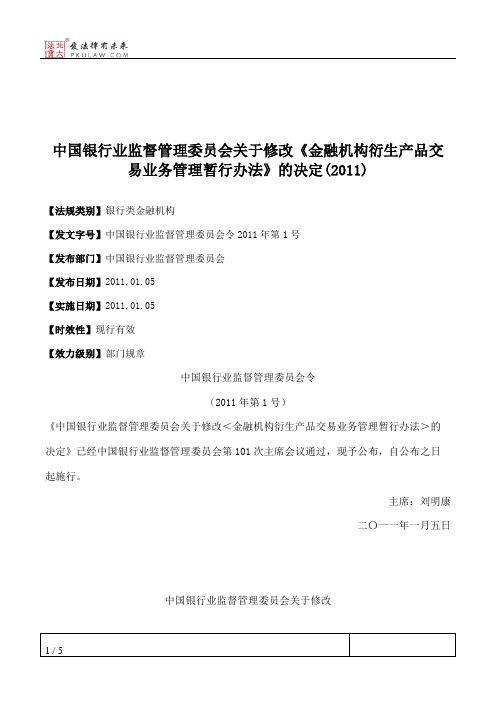
中国银行业监督管理委员会关于修改《金融机构衍生产品交易业务管理暂行办法》的决定(2011)【法规类别】银行类金融机构【发文字号】中国银行业监督管理委员会令2011年第1号【发布部门】中国银行业监督管理委员会【发布日期】2011.01.05【实施日期】2011.01.05【时效性】现行有效【效力级别】部门规章中国银行业监督管理委员会令(2011年第1号)《中国银行业监督管理委员会关于修改<金融机构衍生产品交易业务管理暂行办法>的决定》已经中国银行业监督管理委员会第101次主席会议通过,现予公布,自公布之日起施行。
主席:刘明康二〇一一年一月五日中国银行业监督管理委员会关于修改《金融机构衍生产品交易业务管理暂行办法》的决定中国银行业监督管理委员会决定对《金融机构衍生产品交易业务管理暂行办法》作如下修改:一、第二条修改为:“本办法所称银行业金融机构是指依法设立的商业银行、城市信用合作社、农村信用合作社等吸收公众存款的金融机构以及政策性银行。
依法设立的金融资产管理公司、信托公司、企业集团财务公司、金融租赁公司,以及经中国银行业监督管理委员会(以下简称中国银监会)批准设立的其他银行业金融机构从事衍生产品业务,适用本办法。
”二、第四条修改为:“本办法所称银行业金融机构衍生产品交易业务按照交易目的分为两类:(一)套期保值类衍生产品交易。
即银行业金融机构主动发起,为规避自有资产、负债的信用风险、市场风险或流动性风险而进行的衍生产品交易。
此类交易需符合套期会计规定,并划入银行账户管理。
(二)非套期保值类衍生产品交易。
即除套期保值类以外的衍生产品交易。
包括由客户发起,银行业金融机构为满足客户需求提供的代客交易和银行业金融机构为对冲前述交易相关风险而进行的交易;银行业金融机构为承担做市义务持续提供市场买、卖双边价格,并按其报价与其他市场参与者进行的做市交易;以及银行业金融机构主动发起,运用自有资金,根据对市场走势的判断,以获利为目的进行的自营交易。
中国银监会办公厅关于《银行业金融机构衍生产品交易业务管理暂行
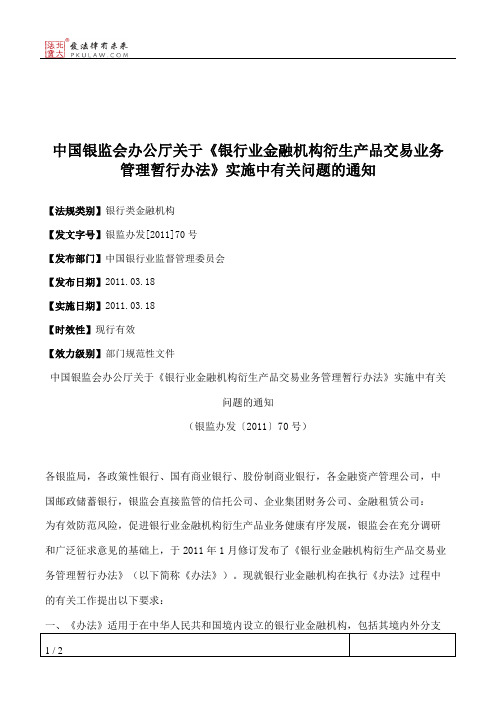
中国银监会办公厅关于《银行业金融机构衍生产品交易业务管理暂行办法》实施中有关问题的通知
【法规类别】银行类金融机构
【发文字号】银监办发[2011]70号
【发布部门】中国银行业监督管理委员会
【发布日期】2011.03.18
【实施日期】2011.03.18
【时效性】现行有效
【效力级别】部门规范性文件
中国银监会办公厅关于《银行业金融机构衍生产品交易业务管理暂行办法》实施中有关
问题的通知
(银监办发〔2011〕70号)
各银监局,各政策性银行、国有商业银行、股份制商业银行,各金融资产管理公司,中国邮政储蓄银行,银监会直接监管的信托公司、企业集团财务公司、金融租赁公司:
为有效防范风险,促进银行业金融机构衍生产品业务健康有序发展,银监会在充分调研和广泛征求意见的基础上,于2011年1月修订发布了《银行业金融机构衍生产品交易业务管理暂行办法》(以下简称《办法》)。
现就银行业金融机构在执行《办法》过程中的有关工作提出以下要求:
一、《办法》适用于在中华人民共和国境内设立的银行业金融机构,包括其境内外分支
机构。
各银行业金融机构在执行《办法》有关规定过程中,总行(部)应负责对包括境外分支机构在内的全部分支机构的情况统。
中国银行业监督管理委员会关于修改《金融机构衍生产品交易业务管理暂行办法》的决定

中国银行业监督管理委员会关于修改《金融机构衍生产品交易
业务管理暂行办法》的决定
无
【期刊名称】《中华人民共和国国务院公报》
【年(卷),期】2011(000)018
【摘要】中国银行业监督管理委员会决定对《金融机构衍生产品交易业务管理暂
行办法》作如下修改:
【总页数】15页(P34-48)
【作者】无
【作者单位】不详
【正文语种】中文
【中图分类】F832.0
【相关文献】
1.银监会发布《金融机构衍生产品交易业务管理暂行办法》 [J],
2.中国银行业监督管理委员会关于修改《金融机构衍生产品交易业务管理暂行办法》的决定 [J],
3.银行业金融机构衍生产品交易业务管理暂行办法 [J], ;
4.银行业金融机构衍生产品交易业务管理暂行办法 [J], ;
5.中国银行业监督管理委员会关于修改《中国银行业监督管理委员会行政处罚办法》的决定 [J],
因版权原因,仅展示原文概要,查看原文内容请购买。
银行业金融机构衍生产品交易业务管理暂行办法 英文版
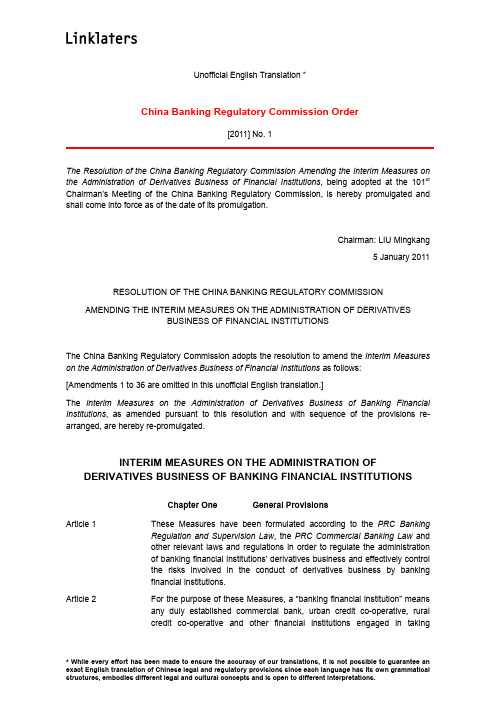
Unofficial English Translation *China Banking Regulatory Commission Order[2011] No. 1The Resolution of the China Banking Regulatory Commission Amending the Interim Measures on the Administration of Derivatives Business of Financial Institutions,being adopted at the 101st Chairman’s Meeting of the China Banking Regulatory Commission, is hereby promulgated and shall come into force as of the date of its promulgation.Chairman: LIU Mingkang5 January 2011RESOLUTION OF THE CHINA BANKING REGULATORY COMMISSIONAMENDING THE INTERIM MEASURES ON THE ADMINISTRATION OF DERIVATIVESBUSINESS OF FINANCIAL INSTITUTIONSThe China Banking Regulatory Commission adopts the resolution to amend the Interim Measures on the Administration of Derivatives Business of Financial Institutions as follows:[Amendments 1 to 36 are omitted in this unofficial English translation.]The Interim Measures on the Administration of Derivatives Business of Banking Financial Institutions,as amended pursuant to this resolution and with sequence of the provisions re-arranged, are hereby re-promulgated.INTERIM MEASURES ON THE ADMINISTRATION OF DERIVATIVES BUSINESS OF BANKING FINANCIAL INSTITUTIONSChapter One General ProvisionsArticle 1These Measures have been formulated according to the PRC Banking Regulation and Supervision Law, the PRC Commercial Banking Law andother relevant laws and regulations in order to regulate the administrationof banking financial institutions’ derivatives business and effectively controlthe risks involved in the conduct of derivatives business by bankingfinancial institutions.Article 2For the purpose of these Measures, a “banking financial institution” means any duly established commercial bank, urban credit co-operative, ruralcredit co-operative and other financial institutions engaged in takingdeposits from the general public and policy banks.These Measures shallapply to the derivatives business conducted by a duly established financialasset management company, trust company, corporate group financecompanies, financial leasing company, or other banking financialinstitutions established under the approval of China Banking RegulatoryCommission (“CBRC”).Article 3For the purpose of these Measures, “derivatives” means a kind of financial contract, the value of which is determined on the basis of one or moreunderlying assets or indices. The basic types of such contracts includeforwards, futures, swaps(exchanges) and options. Derivative products alsoinclude hybrid financial instruments having one or more features offorwards, futures, swaps and options.Article 4For the purpose of these Measures, derivatives trading business conducted by banking financial institutions can be classified into two types based onthe purposes of the transaction:(1)“Derivative transactions for hedging purposes” are transactionsinitiated by a banking financial institution and conducted by it forhedging the credit, market or liquidity risks in respect of its ownassets and liabilities. This type of transaction is subject to theaccounting rules for hedging and managed as a banking book item.(2)“Derivative transactions for non-hedging purposes” are derivativetransactions other than for hedging purposes, and include:transactions for clients which are initiated by clients and provided bya banking financial institution to meet the needs of clients, andtransactions conducted by such banking financial institution tohedge the risks in relation to the aforementioned transactions;transactions with other market participants based on applicableprices in the continued provision of bid and offer prices by abanking financial institution in discharge of its market-makingobligations; and transactions initiated and conducted by a bankingfinancial institution, using its own funds, relying on its judgment ofmarket trends and for the purpose of making profit.This type oftransaction is managed as a trading book item.Article 5For the purpose of these Measures, “clients” mean individual and institutional clients other than financial institutions. Wealth managementproducts sold to clients by a banking financial institution, which have thecharacteristics of derivatives, shall be subject to these Measures in relationto its product design, trading and management; client access and salesprocess shall be subject to the relevant regulations of CBRC in respect ofwealth management business.Risk assessment and sales of derivativeproducts for individuals shall be subject to the relevant regulations inrespect of wealth management business for individuals.Article 6The launch of derivatives trading business by a banking financial institution shall be subject to the prior approval as well as the supervision andinspection of the CBRC.A banking financial institution which has received approval for conductingderivative transactions shall conduct business in line with its own riskmanagement capability.Article 7To transact in derivative products linked to foreign exchange, commodities, energy and equities, and exchange-traded derivatives,a banking financialinstitution shall obtain the qualification for derivatives trading businessgranted by the CBRC and comply with the State’s foreign exchangeadministration regulations and other relevant regulations.Chapter Two Market Access ControlArticle 8The qualifications for banking financial institutions to launch derivatives trading business shall fall into the following two categories:(1)basic qualification, which permits only derivative transactions forhedging purposes; and(2)ordinary qualification, which permits, in addition to the derivativetransactions permissible under the basic qualification,derivativetransactions for non-hedging purposes. The regulatory authoritiesmay, depending on a banking financial institution’s riskmanagement capability,impose differentiated qualificationadministration in respect of its specific business model, producttypes and others.Article 9 A banking financial institution applying for the basic qualification shall meet the following conditions:(1)having a sound derivatives trading risk management system andinternal control system;(2)having no less than 2 traders who have received no less than 6months’ dedicated training in relevant derivatives trading skills andhave no less than 2 years’ experience in derivative products orrelevant business;having no less than 1 relevant risk controllingpersonnel and no less than 1 risk model researcher or risk analystand no less than 1 personnel proficient in the operationalprocedures and rules of hedge accounting; each of the above postsshall have a dedicated personnel and shall not be held by the sameperson concurrently. None of such personnel shall have any recordof misdemeanour;(3)having suitable trading premises and equipment;(4)having a dedicated department and relevant professionals forhandling legal matters and compliance and internal control;(5)meeting the requirements of the CBRC’s prudent supervisionstandard; and(6)any other conditions prescribed by the CBRC.Article 10 A banking financial institution applying for the ordinary qualification shall meet the following conditions in addition to the above conditions for thebasic qualification:(1)having a business management system automatically linking itsfront, middle and back offices for derivatives trading and a real-timerisk management system;(2)the personnel in charge of derivatives trading business having 5years or more of direct experience in derivatives trading activitiesand risk control, and shall have no record of misdemeanour;(3)having a strict business separation system to ensure the effectiveseparation of hedging business from non-hedging business inrespect of their respective market information, risk control andloss/profit accounting;(4)having a sound risk-management framework for market risks,operational risks, credit risks and others; and(5)any other conditions prescribed by the CBRC.Article 11 A foreign-funded bank intending to launch derivatives trading business shall submit application documents signed by its authorised signatory to the localregulatory authority. After the local regulatory authority has reviewed theapplication documents and given its consent, the application documentsshall be submitted to the CBRC for review and approval. In the case of awholly foreign owned bank or a Chinese-foreign joint-venture bank, theapplication documents shall be submitted to the local regulatory authorityby the head office of such bank.Where a foreign bank intends to launchderivatives trading business in two or more of its branches in China, theapplication documents shall be submitted to the local regulatory authorityby its managing branch in China. After the local regulatory authority hasreviewed the application documents and given its consent, the applicationdocuments shall be submitted to the CBRC for review and approval.Where the branch office of a foreign bank applies for the launch ofderivatives trading business, it shall obtain a formal authorisation from itshead office (regional headquarters),its home country must have the legalframework for the supervision of derivatives trading business and theregulatory authority in its home country must have the competence for suchsupervision.If the branch office of a foreign bank applying for the launch of derivativestrading business is unable to meet the conditions in Article 9 or 10, its headoffice (regional headquarters) shall meet the above conditions and suchbranch office shall meet the following additional conditions:(1)the official authorisation for derivative transactions from its headoffice (regional headquarters) shall set out specifically the typesand quota of derivative transactions to be conducted;(2)unless the head office specifies otherwise,all derivativetransactions of such branch are to be squared through a unifiedsystem of the authorising head office (regional headquarters) on areal-time basis, and such head office (regional headquarters) will beresponsible for squaring, exposure management and risk control ofsuch transactions.Other banking financial institutions subject to territorial jurisdiction of thelocal regulatory authority shall submit application documents to the localregulatory authority. After the local regulatory authority has reviewed theapplication documents and given its consent, the application documentsshall be submitted to the CBRC for review and approval. Other bankingfinancial institution under CBRC’s direct administration shall submitapplication documents directly to the CBRC for review and approval.Article 12To apply for the launch of derivatives trading business, a banking financial institution shall submit to the CBRC or its agency the following documentsand materials (in triplicate):(1)an application report, a feasibility report and business plan orbusiness development plan in respect of the launch of derivativestrading business;(2)internal control rules and regulations for the derivatives tradingbusiness;(3)accounting rules for the derivatives trading business;(4) a list of the personnel in charge and the principal traders and theircurriculum vitae;(5) a risk management system for derivative transactions, includingwithout limitation, rules for quantifying risk exposure or a system forthe administration of authorisation of risk limits;(6) a security and stability test report in respect of the trading premises,equipment and system; and(7)any other document and information required by the CBRC.If the branch of a foreign bank applying for the launch of derivatives tradingbusiness is unable to meet the conditions set out in Article 9 or 10, inaddition to submitting the above documents and materials to its head office(regional headquarters), such branch shall also submit the followingdocuments to the local banking regulatory authority:(1)the official written authorisation from its head office (regionalheadquarters) in respect of the specific types and quota ofderivative transactions to be conducted;(2)unless its head office specifies otherwise, a letter of undertakingfrom its head office (regional headquarters) which undertakes allderivative transactions of such branch are to be squared through aunified system of the authorising head office (regional headquarters)on a real-time basis, and that such head office (regionalheadquarters) will be responsible for the squaring, exposuremanagement and risk control of such derivative transactions.Article 13The accounting rules for derivative transactions submitted by a banking financial institution shall comply with the accounting standards of thePeople’s Republic of China. To the extent relevant standards are notavailable in China, such accounting rules shall comply with the relevantinternational standards. Local branch of a foreign bank may comply with theaccounting standards of its head office or its home country.Article 14The security testing report with respect to the premises, equipment and system to be provided by a banking financial institution in accordance withthese Measures shall, in principle, be issued independently by a third party.Article 15The internal control rules and regulations for the derivatives trading business to be launched by a banking financial institution shall include atleast the following:(1)the guiding principles and business operating procedures (whichprocedures shall reflect the principle of the separation of its frontoffice, mid-office and back office) for derivatives trading business,and contingent plans to deal with emergencies;(2)approval system and procedures of the new business and newderivative products;(3)transaction types and their respective risk control system;(4)risk model specifications and quantified management specificationsfor derivatives trading business;(5)risk management system and internal audit system;(6)management system and post-assessment system for researchand development of derivatives trading business;(7)code of conduct for traders;(8)post responsibility system for personnel in charge of trading andaccountability system and incentive and restraint mechanism formanagement personnel at various levels and traders;(9)training plans for its front, middle and back office managementpersonnel and staff;(10)other contents required by the CBRC.Article 16The CBRC shall give its approval or response within 3 months upon the receipt of a complete set of application materials submitted by a financialinstitution in accordance with these Measures.Article 17Where a banking financial institution intends to authorise a branch office to conduct derivatives trading business, it shall carry out a strict review of therisk management capability of such branch office, and shall issue formalwritten authorisations in respect of relevant transaction types and quotas.Derivative transactions conducted by branch offices within China shall besquared through a unified system of its head office (headquarters) on areal-time basis, and such head office (headquarters) shall be responsiblefor the squaring, exposure management and risk control of suchtransactions.The branch office referred to above shall report to the local bankingregulatory authority and produce the written authorisation from its headoffice (headquarters) within 30 days upon the receipt of such authorisationfrom its head office (headquarters) or upon any change in suchauthorisation.Local branch of a foreign bank shall take the initiative to promptly report tothe CBRC of any change in its authorisation.Chapter Three Risk ControlArticle 18 A banking financial institution shall determine the appropriateness of its conducting derivatives trading business and the types and scale ofderivative transactions to be conducted having regard to its businessobjectives, capital strengths, management ability and characteristics of therisks involved in derivative transactions.A banking financial institution engaged in derivatives trading business shallsubmit a written inquiry to the regulatory authority before it develops a newtype of products, ventures into new markets or engages in otherinnovations.A banking financial institution shall gradually improve its capability inindependent innovation, transaction management and risk managementand shall engage in derivative transactions which it is not capable ofvaluing after exercising great care. A banking financial institution shall nothold for its own account, or sell to any clients,derivative products involvingnaked short-selling with potentially unlimited loss or derivative productswhich underlying assets are derivative products or which are linked toderivative products.Article 19 A banking financial institution shall, according to the classification of derivatives trading business in Article 4, establish a complete and reliablerisk control system in relation to market risks, credit risks, operating risksand legal compliance risks, an internal control system and a businessprocessing system commensurate with the nature, scale and complexity ofthe derivatives trading business to be conducted, and shall be staffed withpersonnel with the relevant business knowledge and skills to operate thesaid risk control system, internal control system and business processingsystem referred to above.Article 20The board of directors or the authorised special committee of a banking financial institution shall assess the existing business status and risk controlpolicies and procedures with respect to derivative transactions on a regularbasis to ensure that they are in line with the institution’s capital strengthsand management capability. Where new derivative products are introducedfrequently or the systems are significantly altered, the frequency of theassessment shall be increased accordingly.Article 21The senior management personnel of a banking financial institution shall be aware of the risks involved in the derivative transactions being conducted,shall review, approve and assess the comprehensive managementframework, including the principles, procedures, organisation and authority,for conducting derivatives trading business and its risk control; and shallhave ready access to information on the risk conditions of derivativetransactions through an independent risk control department and a soundinspection and reporting system, and shall provide correspondingsupervision and guidance. Based on the above, the banking financialinstitution shall also assess its own derivatives trading business on a yearlybasis and submit the assessment report of the previous year (in duplicate)to the regulatory authority by the end of January of each year.Article 22 A banking financial institution shall determine appropriate specifications and methods for measuring the risk exposure of its derivative transactionsbased on the institution’s overall strengths, availability of its own funds,profitability, business operation principles, trading target of the derivativetransactions and forecast of market trends.A banking financial institution shall establish and strictly enforce anauthorisation and stop-loss system, formulate, regularly review and updaterisk exposure limits, stop-loss limits, contingent plans and rules andspecifications for stress testing in relation to derivatives trading business,and formulate procedures for limit monitoring and over-limit treatment.When conducting a derivative transaction, a banking financial institutionshall strictly enforce the policies for authorisation levels and risk exposurecontrol. Any material transaction or new derivative business shall besubject to the approval of the board of directors or its authorised specialcommittee or by the senior management. When unrealised losses haveoccurred due to market changes or wrong decision, a banking financialinstitution shall strictly enforce its stop-loss policy.A trader who acts outside the scope of its authorisation or commits anirregularity in trading and the relevant supervisor shall be held strictlyaccountable and subject to punishment.Article 23 A banking financial institution shall strengthen the authorisation and management of its branch offices in their derivative transactions. For thebranch offices with relatively weak capability in operating derivativeproducts, controlling risk and managing business, their authority to tradederivatives shall be withdrawn from them as appropriate. A bankingfinancial institution shall specify the types and characteristics of thematerial risks in derivative transactions in the relevant risk control policiesand set out the procedures for revoking trading authorisation; for thebranch offices where material risks in derivative transactions has occurred,their authorisation to trade derivative products shall be promptly revoked.Article 24The personnel of a banking financial institution in charge of risk measurement, monitoring and control shall not hold concurrent office inderivatives trading or marketing and vice versa. Personnel in charge of riskmeasurement, monitoring and control may report on the risk situationdirectly to the senior management. A trader for derivative transactions forhedging purposes shall not hold concurrent office as trader for derivativetransactions for non-hedging purposes (each as defined in Article 4) andvice versa. A banking financial institution shall also ensure that the relevanttrading information in relation to the different types of derivativetransactions is segregated from each other.Article 25 A banking financial institution shall set out clear criteria for ascertaining the qualifications of employees such as traders, analysts and sales persons,and provide training to sales persons and other relevant employeesaccording to the complexity of derivative transactions and risk control toensure that they have the necessary skills and qualifications.Article 26 A banking financial institution shall formulate reasonable cost and asset analysis and measurement rules and scientific and appropriate incentiveand control mechanism. It shall not simply link the income of derivativestrade and risk management personnel to the current business performanceto avoid excessive pursuit of profit and increased trading risk.Article 27 A banking financial institution shall enforce regular shift mechanism and compulsory paid leave policies for its supervisors and traders engaged inderivatives trading.Article 28The internal audit department of a banking financial institution shall regularly review the implementation of the risk control policies for itsderivatives trading business. Internal audit of derivatives trading policiesand business shall have the following elements:(1)adequate internal auditors with relevant experience and skills; and(2)an independent reporting route to the board of directors from suchinternal audit department.Article 29 A banking financial institution shall establish and perfect the mechanism and policies for the control of legal risk and strictly examine the legal statusand trading qualifications of its transaction counterparties. When enteringinto a derivatives trading contract with a counterparty, a banking financialinstitution shall refer to international and domestic market practices, givefull consideration to factors such as the enforceability of legal recourse inthe event of an event of default, and take effective measures to addresslegal risks involved in the course of drafting, negotiation and execution ofthe trading contract.Article 30 A banking financial institution shall formulate and improve rules for reviewing and managing contracts and other legal documents related toderivative transactions. It shall review derivative transaction contracts andtheir validity and effect at least once every year according to the situationsof the trading counterparty, so as to have a better understanding of thesame and effectively address relevant legal risks.Article 31 A banking financial institution shall establish relevant policies for assessing the suitability of its transaction counterparty, including whether itstransaction counterparty fully understands the contract terms and itsobligation under the contract and whether the derivative transaction to beentered into is in line with the purpose for which the transactioncounterparty is entering into the derivative transaction. In satisfying therequirements under this Article, a banking financial institution may in goodfaith reasonably rely on the formal written documents provided by itstransaction counterparty.Article 32 A banking financial institution shall establish a sound credit risk control system in respect of its transaction counterparty selecting suitable methodsand models to assess the credit risk of such counterparty, and adoptingappropriate risk mitigation measures.A banking financial institution shall by appropriate means expressly informthe transaction counterparty of the impact the relevant credit risk mitigationmeasures may have on such counterparty.Article 33 A banking financial institution shall use appropriate risk assessment methods and models to assess the market risk of a derivative transaction.Itshall manage market risk according to the principle of market valuation (forthis purpose, a third party’s independent valuation and pricing may beproperly adopted as the market valuation of derivative products)andaccordingly adjust the transaction size, type and level of risk exposure.Article 34Decisions to initiate a derivative transaction for hedging purposes and relevant trading decisions shall be made by a banking financial institution’sasset and liability management department according to the institution’sgenuine needs.Article 35 A banking financial institution conducting derivative transactions for non-hedging purposes shall make provisions for the market risk capital for therisk exposure of such derivative products. Such market risk capital shall becalculated pursuant to the relevant provisions of the AdministrativeMeasures for Capital Adequacy Ratio of Commercial Banks and theRegulatory Guidelines on Internal Model Approach for Market Risk CapitalMeasurement of Commercial Banks.Article 36In terms of a banking financial institution conducting derivative transactions for non-hedging purposes, its standard model market risk capital shall notexceed 3% of the core capital of such banking financial institution.Regulatory authorities may impose dynamic and differentiated restrictionswithin such capital ceiling based on the business conditions of a bankingfinancial institution. The standard model market risk capital shall becalculated pursuant to the relevant provisions of the AdministrativeMeasures for Capital Adequacy Ratio of Commercial Banks.Article 37 A banking financial institution shall, according to the size and type of derivative transactions,establish complete monitoring and pre-warningsystems for liquidity risks and make adequate arrangements to ensureliquidity so that it has sufficient capability to perform the contract in theevent of unusual market movements.Article 38 A banking financial institution shall establish and improve the system and rules for controlling operational risks and clearly define the duties for theoperation and monitoring of derivative transactions, including withoutlimitation, the generation and completion of the trading documentations,trading confirmation, netting settlement, review of trades, market value re-valuation, abnormality reporting, accounting treatment, etc. Documentationand recordings generated in the course of derivative transactions shall befiled in a unified filing system and regularly reviewed by the department incharge.Article 39 A banking financial institution shall clear the derivative transactions in accordance with the regulations of the CBRC, shall ensure the relevantsettlement obligations are discharged, shall properly deal with events ofdefault and termination events and shall recognise and manage operationrisks on a timely basis.Article 40 A banking financial institution shall establish or improve information management system for derivative transactions so as to ensure thecompleteness and validity of information as classified by product andtrading counterparties, etc.Article 41 A banking financial institution shall, pursuant to the requirements of the CBRC, submit to the CBRC the accounting and statistical statements andother reports relating to derivative transactions.A banking financial institution shall, pursuant to the information disclosurerequirements of the CBRC, disclose externally the risks, losses, changes inprofits and any unusual circumstances in the conduct of derivativetransactions.Article 42 A banking financial institution shall take prompt and effective measures to mitigate its losses when any material business risk or material businessloss has occurred to its derivative transactions, and on its own initiativepromptly report the relevant circumstances to the CBRC.A banking financial institution shall take the initiative to promptly report tothe CBRC of the details of any material changes in its derivativetransactions, operational system and risk control system, etc.Article 43The CBRC may inspect the information and statements, risk control system, internal control system and business processing system of abanking financial institution in relation to its derivatives trading business to。
银行业金融机构衍生产品交易业务管理暂行办法(2011修订)

银行业金融机构衍生产品交易业务管理暂行办法(2011修订)【法规类别】银行类金融机构【发文字号】中国银行业监督管理委员会令2011年第1号【发布部门】中国银行业监督管理委员会【发布日期】2011.01.05【实施日期】2011.01.05【时效性】现行有效【效力级别】部门规章银行业金融机构衍生产品交易业务管理暂行办法(2004年2月4日以中国银行业监督管理委员会令2004年第1号公布,自2004年3月1日起施行2007年7月3日根据中国银行业监督管理委员会关于修改《金融机构衍生产品交易业务管理暂行办法》的决定第一次修订2011年1月5日根据中国银行业监督管理委员会第101次主席会议《关于修改〈金融机构衍生产品交易业务管理暂行办法〉的决定》第二次修订并以中国银行业监督管理委员会令2011年第1号公布)第一章总则第一条为规范银行业金融机构衍生产品业务,有效控制银行业金融机构衍生产品业务风险,根据《中华人民共和国银行业监督管理法》、《中华人民共和国商业银行法》及其他有关法律法规,制定本办法。
第二条本办法所称银行业金融机构是指依法设立的商业银行、城市信用合作社、农村信用合作社等吸收公众存款的金融机构以及政策性银行。
依法设立的金融资产管理公司、信托公司、企业集团财务公司、金融租赁公司,以及经中国银行业监督管理委员会(以下简称中国银监会)批准设立的其他银行业金融机构从事衍生产品业务,适用本办法。
第三条本办法所称衍生产品是一种金融合约,其价值取决于一种或多种基础资产或指数,合约的基本种类包括远期、期货、掉期(互换)和期权。
衍生产品还包括具有远期、期货、掉期(互换)和期权中一种或多种特征的混合金融工具。
第四条本办法所称银行业金融机构衍生产品交易业务按照交易目的分为两类:(一)套期保值类衍生产品交易。
即银行业金融机构主动发起,为规避自有资产、负债的信用风险、市场风险或流动性风险而进行的衍生产品交易。
此类交易需符合套期会计规定,并划入银行账户管理。
20110412银行业衍生产品交易监管政策介绍

◆ 第三章 风险管理
﹥主要内容 主要内容 -- 从事与风险管理能力相适应的衍生产品交易业务 -- 内部风险管理制度、授权与止损制度与人员配置制度 -- 衍生产品交易业务的评估 -- 不同类别衍生产品交易的风险管理、市场信息、人员配置 的隔离制度 -- 法律风险管理 -- 市场风险管理 -- 操作风险管理
◆ 第三章 风险管理
﹥第二十一条 衍生产品业务的评估 第二十一条 第二十一 -- 银行业金融机构应当每年一次对其自身衍生产品业务情 况进行评估,并将上一年度评估报告一式两份于每年一月底之 前报送监管机构。
◆ 第三章 风险管理
﹥第二十九至三十条 法律风险管理 第二十九至三十条 第二十九至三十 -- 银行业金融机构应当建立健全控制法律风险的机制和制 度,严格审查交易对手的法律地位和交易资格。 -- 银行业金融机构应当制定完善针对衍生产品交易合同等 法律文本的评估及管理制度。
◆ 第二章 市场准入管理
﹥第十二条 申请衍生产品交易资格所需提交的材料 第十二条 -- 开办衍生产品交易业务的申请报告、可行性报告及业务 计划书或展业计划; -- 衍生产品交易业务内部管理规章制度; -- 衍生产品交易会计制度; -- 主管人员和主要交易人员名单、履历; -- 衍生产品交易风险管理制度,包括但不限于:风险敞口 量化规则或风险限额授权管理制度; -- 交易场所、设备和系统的安全性和稳定性测试报告; -- 中国银监会要求的其他文件和资料。
为了帮助保护您的隐私,PowerPoint 禁止自动下载此外部图片。若要下载并显示此图片,请单击消息栏中的 “选项”,然后单击 “启用外部内容 ”。
银行业衍生产品交易监管政策介绍
中国银监会创新监管部 黄直
主要内容 一、我国场外衍生产品市场现状 二、银监会推动我国场外衍生产品市场发展的主要举 措及监管政策 三、监管重点及主要风险点
金融机构衍生产品交易业务管理暂行办法

金融机构衍生产品交易业务管理暂行办法为规范金融机构衍生产品交易业务管理,促进金融市场稳定健康发展,根据相关法律法规,结合金融监管实践,制定本办法。
(二)衍生产品交易业务管理机构金融机构应当设立专门的衍生产品交易业务管理机构,负责具体实施衍生产品交易监管工作,包括制定衍生产品交易的内部管理制度、风险控制措施、交易监管策略等。
(三)风险控制要求金融机构应当建立完善的衍生产品交易风险控制机制,包括但不限于风险管理制度、风险评估与监控、风险预警及风险应对措施等,确保在衍生产品交易中能够及时有效地识别、评估和控制各类风险。
(四)交易行为管理金融机构在进行衍生产品交易时,应当遵循市场公平、诚信、公开的原则,不得利用非公开信息、操纵市场等手段进行欺诈、违规操作。
(五)合规监管要求金融机构应当配备具有衍生产品交易业务管理经验和专业知识的从业人员,定期开展内部培训,加强对衍生产品交易的合规监管。
(六)信息披露要求金融机构应当按照相关规定,及时、准确地向监管机构和投资者披露衍生产品交易相关信息,包括但不限于交易数据、风险提示、内部管理制度等。
(七)监督检查监管部门应当加强对金融机构衍生产品交易业务管理的监督检查,确保金融机构的衍生产品交易活动符合法律法规和监管要求,不会对金融市场稳定和投资者利益造成严重影响。
对于违法违规行为,依法依规给予严肃处理。
以上为金融机构衍生产品交易业务管理暂行办法。
希望金融机构认真执行,并不断完善相关内部管理制度,提高风险防范能力,切实维护金融市场的稳定和健康发展。
尊敬的领导和同事们:首先,我要对大家所进行的金融机构衍生产品交易业务管理工作表示感谢。
鉴于市场环境的变化和监管要求的提升,我们制定了上述的金融机构衍生产品交易业务管理暂行办法。
这些规定将有助于加强我们对衍生产品交易业务的管理,进一步规范我们的业务行为,最大限度地保护金融市场的稳定和投资者的利益。
在这篇开头的部分里,我们强调了《衍生产品交易业务管理机构》、《风险控制要求》、《交易行为管理》、《合规监管要求》、《信息披露要求》以及《监督检查》等六个方面的内容。
银行业金融机构衍生产品交易业务管理办法
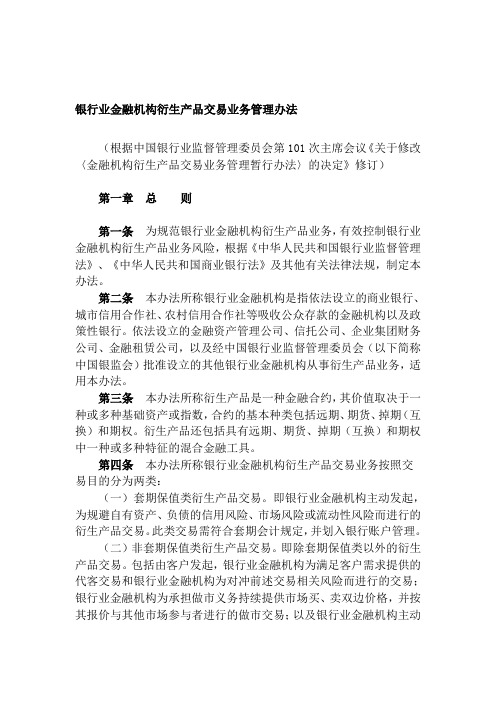
银行业金融机构衍生产品交易业务管理办法(根据中国银行业监督管理委员会第101次主席会议《关于修改〈金融机构衍生产品交易业务管理暂行办法〉的决定》修订)第一章总则第一条为规范银行业金融机构衍生产品业务,有效控制银行业金融机构衍生产品业务风险,根据《中华人民共和国银行业监督管理法》、《中华人民共和国商业银行法》及其他有关法律法规,制定本办法。
第二条本办法所称银行业金融机构是指依法设立的商业银行、城市信用合作社、农村信用合作社等吸收公众存款的金融机构以及政策性银行。
依法设立的金融资产管理公司、信托公司、企业集团财务公司、金融租赁公司,以及经中国银行业监督管理委员会(以下简称中国银监会)批准设立的其他银行业金融机构从事衍生产品业务,适用本办法。
第三条本办法所称衍生产品是一种金融合约,其价值取决于一种或多种基础资产或指数,合约的基本种类包括远期、期货、掉期(互换)和期权。
衍生产品还包括具有远期、期货、掉期(互换)和期权中一种或多种特征的混合金融工具。
第四条本办法所称银行业金融机构衍生产品交易业务按照交易目的分为两类:(一)套期保值类衍生产品交易。
即银行业金融机构主动发起,为规避自有资产、负债的信用风险、市场风险或流动性风险而进行的衍生产品交易。
此类交易需符合套期会计规定,并划入银行账户管理。
(二)非套期保值类衍生产品交易。
即除套期保值类以外的衍生产品交易。
包括由客户发起,银行业金融机构为满足客户需求提供的代客交易和银行业金融机构为对冲前述交易相关风险而进行的交易;银行业金融机构为承担做市义务持续提供市场买、卖双边价格,并按其报价与其他市场参与者进行的做市交易;以及银行业金融机构主动发起,运用自有资金,根据对市场走势的判断,以获利为目的进行的自营交易。
此类交易划入交易账户管理。
第五条本办法所称客户是指除金融机构以外的个人客户和机构客户。
银行业金融机构向客户销售的理财产品若具有衍生产品性质,其产品设计、交易、管理适用本办法,客户准入以及销售环节适用中国银监会关于理财业务的相关规定。
- 1、下载文档前请自行甄别文档内容的完整性,平台不提供额外的编辑、内容补充、找答案等附加服务。
- 2、"仅部分预览"的文档,不可在线预览部分如存在完整性等问题,可反馈申请退款(可完整预览的文档不适用该条件!)。
- 3、如文档侵犯您的权益,请联系客服反馈,我们会尽快为您处理(人工客服工作时间:9:00-18:30)。
银行业金融机构衍生产品交易业务管理暂行办法(根据中国银行业监督管理委员会第101次主席会议《关于修改〈金融机构衍生产品交易业务管理暂行办法〉的决定》修订)第一章总则第一条为规范银行业金融机构衍生产品业务,有效控制银行业金融机构衍生产品业务风险,根据《中华人民共和国银行业监督管理法》、《中华人民共和国商业银行法》及其他有关法律法规,制定本办法。
第二条本办法所称银行业金融机构是指依法设立的商业银行、城市信用合作社、农村信用合作社等吸收公众存款的金融机构以及政策性银行。
依法设立的金融资产管理公司、信托公司、企业集团财务公司、金融租赁公司,以及经中国银行业监督管理委员会(以下简称中国银监会)批准设立的其他银行业金融机构从事衍生产品业务,适用本办法。
第三条本办法所称衍生产品是一种金融合约,其价值取决于一种或多种基础资产或指数,合约的基本种类包括远期、期货、掉期(互换)和期权。
衍生产品还包括具有远期、期货、掉期(互换)和期权中一种或多种特征的混合金融工具。
第四条本办法所称银行业金融机构衍生产品交易业务按照交易目的分为两类:(一)套期保值类衍生产品交易。
即银行业金融机构主动发起,为规避自有资产、负债的信用风险、市场风险或流动性风险而进行的衍生产品交易。
此类交易需符合套期会计规定,并划入银行账户管理。
(二)非套期保值类衍生产品交易。
即除套期保值类以外的衍生产品交易。
包括由客户发起,银行业金融机构为满足客户需求提供的代客交易和银行业金融机构为对冲前述交易相关风险而进行的交易;银行业金融机构为承担做市义务持续提供市场买、卖双边价格,并按其报价与其他市场参与者进行的做市交易;以及银行业金融机构主动发起,运用自有资金,根据对市场走势的判断,以获利为目的进行的自营交易。
此类交易划入交易账户管理。
第五条本办法所称客户是指除金融机构以外的个人客户和机构客户。
银行业金融机构向客户销售的理财产品若具有衍生产品性质,其产品设计、交易、管理适用本办法,客户准入以及销售环节适用中国银监会关于理财业务的相关规定。
对个人衍生产品交易的风险评估和销售环节适用个人理财业务的相关规定。
第六条银行业金融机构开办衍生产品交易业务,应当经中国银监会批准,接受中国银监会的监督与检查。
获得衍生产品交易业务资格的银行业金融机构,应当从事与其自身风险管理能力相适应的业务活动。
第七条银行业金融机构从事与外汇、商品、能源和股权有关的衍生产品交易以及场内衍生产品交易,应当具有中国银监会批准的衍生产品交易业务资格,并遵守国家外汇管理及其他相关规定。
第二章市场准入管理第八条银行业金融机构开办衍生产品交易业务的资格分为以下两类:(一)基础类资格:只能从事套期保值类衍生产品交易;(二)普通类资格:除基础类资格可以从事的衍生产品交易之外,还可以从事非套期保值类衍生产品交易。
根据银行业金融机构的风险管理能力,监管部门可以对其具体的业务模式、产品种类等实施差别化资格管理。
第九条银行业金融机构申请基础类资格,应当具备以下条件:(一)有健全的衍生产品交易风险管理制度和内部控制制度;(二)具有接受相关衍生产品交易技能专门培训半年以上、从事衍生产品或相关交易2年以上的交易人员至少2名,相关风险管理人员至少1名,风险模型研究人员或风险分析人员至少1名,熟悉套期会计操作程序和制度规范的人员至少1名,以上人员均需专岗专人,相互不得兼任,且无不良记录;(三)有适当的交易场所和设备;(四)具有处理法律事务和负责内控合规检查的专业部门及相关专业人员;(五)满足中国银监会审慎监管指标要求;(六)中国银监会规定的其他条件。
第十条银行业金融机构申请普通类资格,除具备上述基础类资格条件以外还需具备以下条件:(一)完善的衍生产品交易前、中、后台自动联接的业务处理系统和实时风险管理系统;(二)衍生产品交易业务主管人员应当具备5年以上直接参与衍生产品交易活动或风险管理的资历,且无不良记录;(三)严格的业务分离制度,确保套期保值类业务与非套期保值类业务的市场信息、风险管理、损益核算有效隔离;(四)完善的市场风险、操作风险、信用风险等风险管理框架;(五)中国银监会规定的其他条件。
第十一条外资银行开办衍生产品交易业务,应当向当地监管机构提交由授权签字人签署的申请材料,经审查同意后,报中国银监会审批。
外商独资银行、中外合资银行应当由总行统一向当地监管机构提交申请材料;外国银行拟在中国境内两家以上分行开办衍生产品交易业务的,应当由其在华管理行统一向当地监管机构提交申请材料,经审查同意后,报中国银监会审批。
外国银行分行申请开办衍生产品交易业务,应当获得其总行(地区总部)的正式授权,其母国应当具备对衍生产品交易业务进行监管的法律框架,其母国监管当局应当具备相应的监管能力。
申请开办衍生产品交易业务的外国银行分行,如果不具备第九条或第十条所列条件,其总行(地区总部)应当具备上述条件。
同时该分行还应当具备以下条件:(一)其总行(地区总部)对该分行从事衍生产品交易等方面的正式授权对交易品种和限额作出明确规定;(二)除总行另有明确规定外,该分行的全部衍生产品交易统一通过对其授权的总行(地区总部)系统进行实时平盘,并由其总行(地区总部)统一进行平盘、敞口管理和风险控制。
其他由属地监管的银行业金融机构应当先向当地监管机构提交申请材料,经审查同意后,报中国银监会审批;其他由中国银监会直接监管的银行业金融机构直接向中国银监会提交申请材料,报中国银监会审批。
第十二条银行业金融机构申请开办衍生产品交易业务,应当向中国银监会或其派出机构报送以下文件和资料(一式三份):(一)开办衍生产品交易业务的申请报告、可行性报告及业务计划书或展业计划;(二)衍生产品交易业务内部管理规章制度;(三)衍生产品交易会计制度;(四)主管人员和主要交易人员名单、履历;(五)衍生产品交易风险管理制度,包括但不限于:风险敞口量化规则或风险限额授权管理制度;(六)交易场所、设备和系统的安全性和稳定性测试报告;(七)中国银监会要求的其他文件和资料。
外国银行分行申请开办衍生产品交易业务,若不具备第九条或第十条所列条件,该分行除报送其总行(地区总部)的上述文件和资料外,同时还应当向所在地银监局报送以下文件:(一)其总行(地区总部)对该分行从事衍生产品交易品种和限额等方面的正式书面授权文件;(二)除其总行另有明确规定外,其总行(地区总部)出具的确保该分行全部衍生产品交易通过总行(地区总部)交易系统进行实时平盘,并由其总行(地区总部)负责进行平盘、敞口管理和风险控制的承诺函。
第十三条银行业金融机构提交的衍生产品交易会计制度,应当符合我国有关会计标准。
我国未规定的,应当符合有关国际标准。
外国银行分行可以遵从其母国/总行会计标准。
第十四条银行业金融机构按本办法规定提交的交易场所、设备和系统的安全性测试报告,原则上应当由第三方独立做出。
第十五条银行业金融机构开办衍生产品交易业务内部管理规章制度应当至少包括以下内容:(一)衍生产品交易业务的指导原则、业务操作规程(业务操作规程应当体现交易前台、中台与后台分离的原则)和针对突发事件的应急计划;(二)新业务、新产品审批制度及流程;(三)交易品种及其风险控制制度;(四)衍生产品交易的风险模型指标及量化管理指标;(五)风险管理制度和内部审计制度;(六)衍生产品交易业务研究与开发的管理制度及后评价制度;(七)交易员守则;(八)交易主管人员岗位责任制度,对各级主管人员与交易员的问责制度和激励约束机制;(九)对前、中、后台主管人员及工作人员的培训计划;(十)中国银监会规定的其他内容。
第十六条中国银监会自收到银行业金融机构按照本办法提交的完整申请资料之日起三个月内予以批复。
第十七条银行业金融机构法人授权其分支机构办理衍生产品交易业务,须对其风险管理能力进行严格审核,并出具有关交易品种和限额等方面的正式书面授权文件;境内分支机构办理衍生产品交易业务须统一通过其总行(部)系统进行实时平盘,并由总行(部)统一进行平盘、敞口管理和风险控制。
上述分支机构应当在收到其总行(部)授权或授权发生变动之日起30日内,持其总行(部)的授权文件向当地银监局报告。
外国银行分行所获授权发生变动时,应当及时主动向中国银监会报告。
第三章风险管理第十八条银行业金融机构应当根据本机构的经营目标、资本实力、管理能力和衍生产品的风险特征,确定是否适合从事衍生产品交易及适合从事的衍生产品交易品种和规模。
银行业金融机构从事衍生产品交易业务,在开展新的业务品种、开拓新市场等创新前,应当书面咨询监管部门意见。
银行业金融机构应当逐步提高自主创新能力、交易管理能力和风险管理水平,谨慎涉足自身不具备定价能力的衍生产品交易。
银行业金融机构不得自主持有或向客户销售可能出现无限损失的裸卖空衍生产品,以及以衍生产品为基础资产或挂钩指标的再衍生产品。
第十九条银行业金融机构应当按照第四条所列衍生产品交易业务的分类,建立与所从事的衍生产品交易业务性质、规模和复杂程度相适应的、完善的、可靠的市场风险、信用风险、操作风险以及法律合规风险管理体系和制度、内部控制制度和业务处理系统,并配备履行上述风险管理、内部控制和业务处理职责所需要的具备相关业务知识和技能的工作人员。
第二十条银行业金融机构董事会或其授权专业委员会应当定期对现行的衍生产品业务情况、风险管理政策和程序进行评价,确保其与机构的资本实力、管理水平相一致。
新产品推出频繁或系统发生重大变化时,应当相应增加评估频度。
第二十一条银行业金融机构高级管理人员应当了解所从事的衍生产品交易风险;审核评估和批准衍生产品交易业务经营及其风险管理的原则、程序、组织、权限的综合管理框架;并能通过独立的风险管理部门和完善的检查报告系统,随时获取有关衍生产品交易风险状况的信息,进行相应的监督与指导。
在此基础上,银行业金融机构应当每年一次对其自身衍生产品业务情况进行评估,并将上一年度评估报告一式两份于每年一月底之前报送监管机构。
第二十二条银行业金融机构要根据本机构的整体实力、自有资本、盈利能力、业务经营方针、衍生产品交易目的及对市场走向的预测,选择与本机构业务相适应的测算衍生产品交易风险敞口的指标和方法。
银行业金融机构应当建立并严格执行授权和止损制度,制定并定期审查更新各类衍生产品交易的风险敞口限额、止损限额、应急计划和压力测试的制度和指标,制定限额监控和超限额处理程序。
在进行衍生产品交易时,必须严格执行分级授权和敞口风险管理制度,任何重大交易或新的衍生产品业务都应当经由董事会或其授权的专业委员会或高级管理层审批。
在因市场变化或决策失误出现账面浮亏时,应当严格执行止损制度。
对在交易活动中有越权或违规行为的交易员及其主管,要实行严格问责和惩处。
